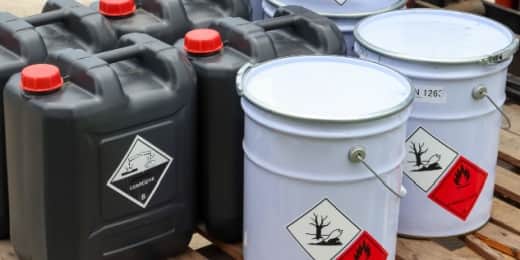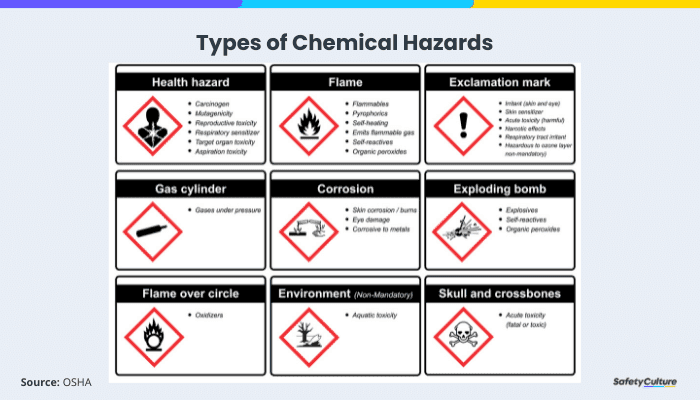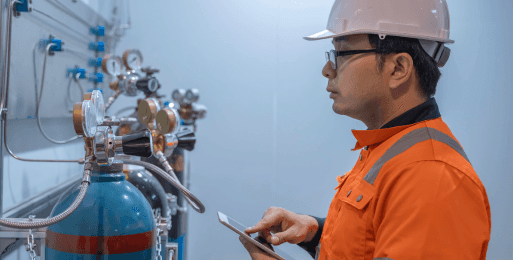Understanding Chemical Safety
Discover what chemical safety is, its importance, and the core elements to include in your chemical safety program.

Published 20 Dec 2024
Article by
4 min read
What is Chemical Safety?
Chemical safety refers to the best practices in handling, storing, or distributing chemicals and ensuring that all personnel in an organization follow these practices. It is imperative for many businesses and industries as it protects workers and the community from the potential hazards that may arise from the mishandling of certain chemicals. Chemical safety encompasses a broad spectrum, from proper storage and handling to emergency response protocols, making it a top priority, especially in the workplace.
Importance
Chemical safety is paramount for several critical reasons. Firstly, it’s the employer’s responsibility to prioritize the well-being of employees by implementing proper handling procedures, providing necessary chemical safety training, and ensuring access to Personal Protective Equipment (PPE). This protects the workforce from potential health hazards and contributes to a safer and more productive work environment.
On top of that, effective chemical safety tools and measures protect a company’s reputation and minimizes financial risks. Accidents involving hazardous chemicals can damage property, lead to environmental contamination, and legal liabilities. By adhering to regulatory standards and best practices in chemical safety, companies demonstrate their commitment to responsible business practices, fostering trust among customers, investors, and the broader community. Ultimately, an effective chemical safety framework not only safeguards human health but also enhances a company’s overall resilience and sustainability.
Improve your EHS Management
Cultivate a safe working environment and streamline compliance with our EHS solutions.
The Core Components of Chemical Safety
Chemical safety takes many forms, depending on the chemicals you handle and the types of processes and workflows you implement. A few core components of chemical safety include the following:
Safe Storage and Handling
Proper storage and handling of chemicals are fundamental to a safe workplace. All chemical safety programs must outline the proper storage environmental conditions, right container usage, and other relevant measures.
Emergency Response Planning
In the event of a chemical emergency, your team must be prepared. Protocols on what to do during specific chemical incidents must be in place, ensuring easy accessibility and well-maintained measures for effective reinforcement. That way, employees are prepared and don’t panic when these events happen.
Employee Training and Awareness
Employee training, awareness, and engagement are key aspects of a successful chemical safety program. Ensuring that your workforce is well-informed about the properties of the chemicals they handle, proper procedures, and the use of PPE will prevent accidents and incidents further down the line.

Auditing and Reporting
Maintaining transparency is critical when following chemical safety procedures. That’s why a key component of these programs must be auditing current systems and reporting on them. That way, managers can easily identify areas of improvement and find ways to boost overall chemical safety in the workplace.
Create your own Chemical Safety Audit Checklist
Build from scratch or choose from our collection of free, ready-to-download, and customizable templates.
Fostering a Culture of Chemical Safety
This component means instilling the best practices and safety philosophies into every employee. As a result, the entire company is engaged in the program, drastically lowering the risk of handling certain chemicals.
Best Practices When Implementing a Chemical Safety Program
Different companies have unique ways of approaching chemical safety. This is because of all the unique factors that may affect how you implement your program. To help put you on the right path when practicing chemical safety, here are a few best practices to follow:
Conduct accurate, consistent, and regular risk assessments on chemical safety operations .
Practice proper chemical labeling.
Ensure that storage facilities are up to regulatory standards.
Create reports for transparency.
Focus on employee training.
Always look to improve your current chemical safety practices.
Practice Chemical Safety with SafetyCulture
Why use SafetyCulture?
SafetyCulture is a mobile-first operations platform adopted across industries such as manufacturing, mining, construction, retail, and hospitality. It’s designed to equip leaders and working teams with the knowledge and tools to do their best work to the safest and highest standard.
Conduct efficient inspections and deliver impactful training courses to promote chemical safety, foster continuous improvement, and ensure regulatory compliance with a comprehensive, powerful tool.
✓ Save time and reduce costs ✓ Stay on top of risks and incidents ✓ Boost productivity and efficiency ✓ Enhance communication and collaboration ✓ Discover improvement opportunities ✓ Make data-driven business decisions
FAQs About Chemical Safety
Related articles
Chemical Safety
Safety

A Guide to OSHA’s Process Safety Management Standard
Learn about process safety management: an OSHA regulation that aims to prevent the release of highly hazardous chemicals using 14 elements.
Safety
Chemical Safety

Understanding Geothermal Power
Understand what geothermal power is, its benefits, challenges in implementation, and the various types of geothermal power plants.
Safety
Chemical Safety

Mastering Hydrogen Safety: A Guide for EHS and OHS Professionals
Understand the importance of hydrogen safety in the workplace, the key risks involved, and global standards for compliance.